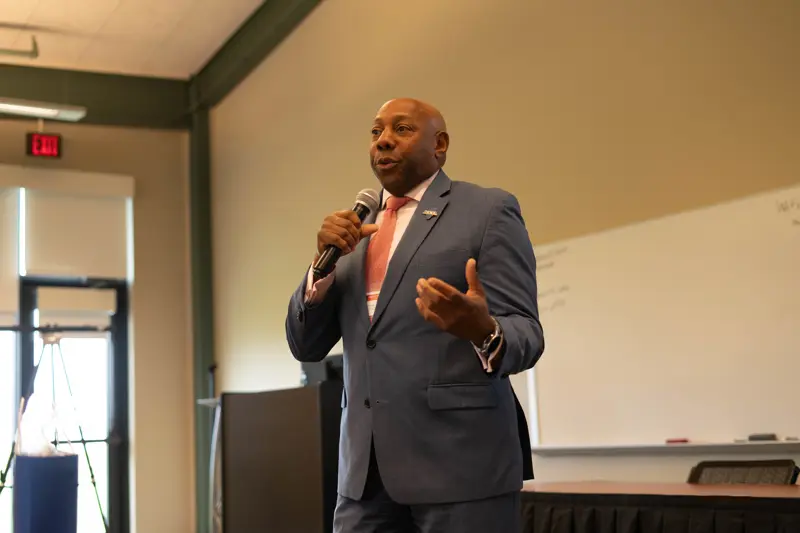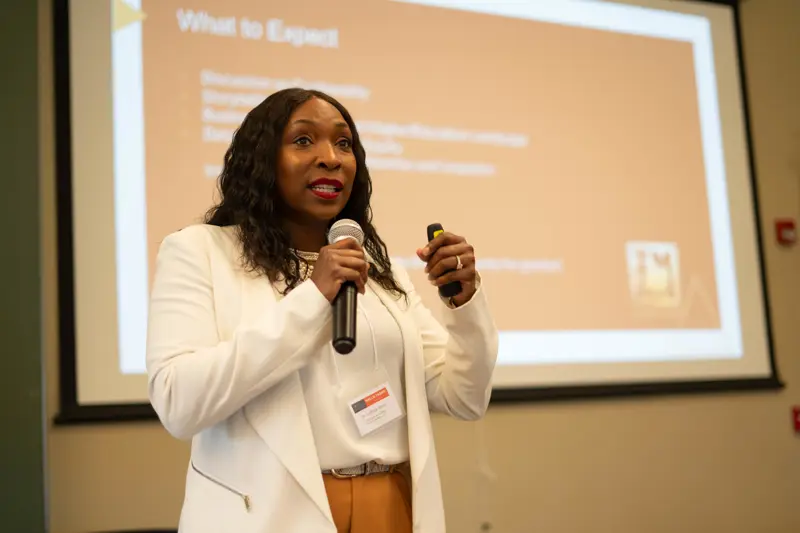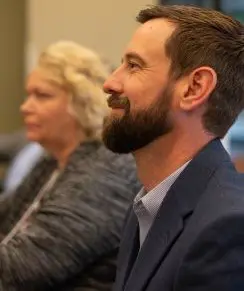What started as a popular institute for community college leaders in Iowa is now gaining traction in the Land of Lincoln.
The Illinois Community College Leadership Institute (ICCLI), an event co-sponsored by OCCRL and the Illinois Community College Board, took place in May for the second year in a row. The institute’s theme was “Community Colleges, Data Literacy, and Equitable Leadership.”
This year’s ICCLI at Richland Community College drew 40% more invited participants compared to last year, with topics ranging from quantitative data literacy to how community college leaders can build better relationships with boards of trustees. Participants received a tour of parts of campus, which included information on a major project at Richland in which carbon dioxide is being captured and stored in the nearby ground. Lunch came courtesy of the Bistro Five Thirty Seven.
 H.M. Kuneyl, a third-year doctoral student in the Department of Education Policy, Organization and Leadership (EPOL), has served as ICCLI’s coordinator since it began last year. She said the joining of scholars and practitioners in one space is important.
H.M. Kuneyl, a third-year doctoral student in the Department of Education Policy, Organization and Leadership (EPOL), has served as ICCLI’s coordinator since it began last year. She said the joining of scholars and practitioners in one space is important.
“The 48 community colleges in Illinois are spread throughout the state, especially in rural areas, making it challenging to find equity-minded individuals to be in community with,” said Kuneyl, who is studying community colleges and their history. “My goal is to help facilitate that sense of community for these scholars and practitioners who are shining as leaders.”
ICCLI began under the direction of OCCRL Director Lorenzo Baber, who for four years at Iowa State University led the “grow your own leadership” concept initiated by Dr. Larry Ebbers. In 1989, Ebbers began the Leadership Institute for a New Century program, which was created for women and minorities who were preparing for leadership positions at community colleges.
Several years later, Ebbers started the Community College Leadership Initiative Consortium, which focused on providing leadership development for mid- and upper-level administrators in community colleges. ICCLI combines key elements of both of Ebbers’ programs through its focus on equity within each topic for burgeoning community college leaders.
A decade after the programs at Iowa State began, Ebbers said he saw an impressive number of past attendees emerge into leadership roles at community colleges.
“The relationships throughout the system are enhanced by the number of people who are able to work together because of bonds developed through programs such as ICCLI,” Ebbers said. “The scholar-practitioner approach is a benefit to all.”
The institutes in Iowa drew community college presidents from 11 community colleges in the state, with most of the deans from Iowa’s 15 community colleges attending the institutes as well.
“We saw the benefits of that in terms of elevating people’s trajectory and also giving the state an opportunity to grow its own generation of leaders of community colleges,” said Dr. Baber, who was an associate professor in the School of Education at Iowa State from 2015 to 2019.
Baber added that ICCLI offers a forum for staving off the inevitable “leadership void” at community colleges as Baby Boomers continue to retire.
ICCLI strives to support the upward trajectory of the invited community college leaders, Baber said. Presenters relate a wealth of research and policy knowledge that participants can learn from and utilize long after the day-and-a-half event ends. Attendees ask questions and discuss issues in groups, forging potential career-long connections.

Jim Reed, executive director of the Illinois Community College Trustees Association, gave a presentation on the importance of leaders understanding how to engage with boards of trustees. He shared perspectives on what leadership entails and the importance of leaders understanding how their bosses and fellow leaders approach situations.
“The leadership team of the president and the board work much more efficiently when the board is a high-performing one and working together as an individual unit,” Reed said. “The education and training we provide help boards achieve that high level of functionality.”
Dr. Felecia Commodore’s talk was in a similar realm but with an equity focus. Using culturally sustaining governance as a framework, she discussed strategies for developing partnerships with governing boards in equity work, sharing with participants how they can “make the equity argument” and “identify board capacity for partnership.”
Dr. Commodore said that engaging with emerging and current community college leaders was a valuable learning experience.
“It was great to hear the passion and commitment toward one of our most important sectors of higher education and their students,” said Commodore, a visiting associate professor in EPOL.

Keynote speaker LaDrina Wilson highlighted how the political nature of diversity, equity, and inclusion has left organizations unequipped to position diversity and inclusion as assets. Dr. Wilson, who runs Iman Consulting, said leaders in higher education should leverage the benefits of DEI and disaggregate data to position their institutions to invest the needed time and financial resources for DEI.
“The goal in doing this is to ensure student success, employee engagement, and localized inclusive economies,” she said.
Dr. Marci Rockey’s presentation focused on ways geographical context can influence educational and workforce opportunities at the individual level. Rockey is an Illinois graduate and former assistant director for community college relations and research at OCCRL. She discussed her research, conducted with Dr. Jasmine Collins, that centers on the extent to which higher education policy initiatives in Illinois support rural communities of color.
“These topics are important,” Dr. Rockey said, “given the current polarizing political atmosphere and the need for community college leaders statewide to work in collaboration with policymakers to close opportunity gaps across diverse rural, suburban, and urban districts.”
View a photo gallery of the event and read about the inaugural 2023 Illinois Community College Leadership Institute.
